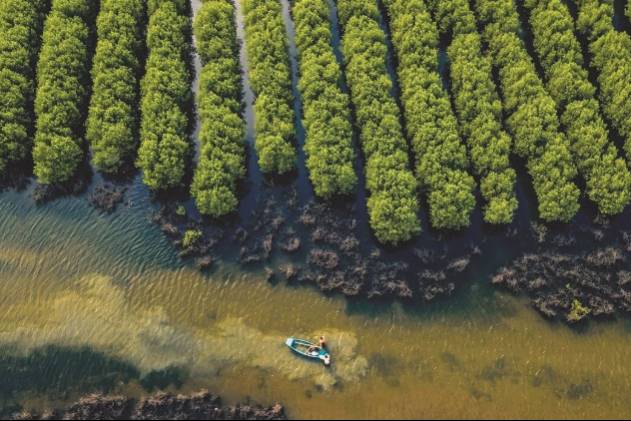Prime Minister Pham Minh Chinh has just officially approved the Project to establish and develop a carbon market in Viet Nam (in Decision No. 232/QD-TTg)
The objective of this Project is to contribute to the implementation of the greenhouse gas emission reduction target committed in the Nationally Determined Contribution (NDC) at low costs for businesses and society, creating new financial flows for greenhouse gas emission reduction activities, promoting green transformation, developing low-emission technologies, contributing to improving the competitiveness of Viet Nam ese enterprises domestically and in the world market, creating a low-carbon economy and proactively responding to climate change, aiming to achieve a net emission of "0" by 2050.
2 types of goods in the carbon market
According to the Project, the Viet Nam ese carbon market will have two types of goods: emission quotas and carbon credits.
In this manner, greenhouse gas emission quotas are allocated to establishments in the list of sectors and establishments emitting greenhouse gases that must conduct greenhouse gas inventories issued by the prime minister in a free-of-charge and auction manner.
Carbon credits are confirmed for trading on the market, including carbon credits obtained from programs and projects under the domestic carbon credit exchange and offset mechanism by the provisions of law; carbon credits obtained from programs and projects under the international carbon credit exchange and offset mechanism: carbon credits received from the Clean Development Mechanism (CDM); carbon credits received from the Joint Credit Mechanism (JCM); carbon credits obtained under the Mechanism under Article 6 of the Paris Agreement.
The trading of greenhouse gas emission quotas and carbon credits is carried out on the domestic carbon exchange. The Hanoi Stock Exchange builds and provides domestic carbon trading floor services according to the professional requirements on market organization and management and the conditions and technical standards developed by the Ministry of Natural Resources and Environment, in coordination with the Ministry of Finance and relevant ministries, branches, and agencies.
Transactions on the carbon market are organized in a centralized manner on the carbon trading floor. Greenhouse gas emission quotas and carbon credits confirmed by the Ministry of Natural Resources and Environment to be traded on the floor will be granted domestic codes to serve the transaction; the codes granted are unique and non-overlapping.
When participating in transactions on the carbon market in Viet Nam, the subjects have a greenhouse gas emission quota trading depository account or a carbon credit trading depository account. The registration and issuance of greenhouse gas emission quotas and carbon credit codes are carried out centrally to ensure that data is unified and synchronized and meets management and monitoring requirements.
Viet Nam Securities Depository and Clearing Corporation provide depository and transaction settlement services according to the professional requirements on organization, market management and conditions, and technical standards developed by the Ministry of Natural Resources and Environment, in coordination with the Ministry of Finance and relevant ministries, branches, and agencies. Transaction settlement will be automatically performed by the system based on the transaction results sent by the Hanoi Stock Exchange, ensuring the principle that the transfer of goods is performed simultaneously with the payment at the payment bank. Payment for transactions on the carbon trading floor is conducted by commercial banks qualified to provide payment services for greenhouse gas emission quotas and carbon credits.
 Viet Nam to officially operate nationwide carbon market from 2029
Viet Nam to officially operate nationwide carbon market from 2029Two operational phases
The Viet Nam ese Government has identified the first phase - the pilot implementation phase of the national carbon market (from 2025 to the end of 2028).
In this phase, the transfer of carbon credits and greenhouse gas emission reduction results to foreign and international partners is studied, specifically regulated in legal documents, and considered and decided upon by competent authorities.
The entire greenhouse gas emission quota is studied and considered for free allocation to greenhouse gas emission facilities in a number of significant emission sectors. Carbon credits are confirmed for trading on the carbon exchange, including carbon credits obtained from Programs and projects under the domestic carbon credit exchange and offset mechanism, Clean Development Mechanism (CDM), Joint Credit Mechanism (JCM), and Mechanism under Article 6 of the Paris Agreement. The Government prescribes the ratio of carbon credits used to offset greenhouse gas emissions over the total greenhouse gas emission quotas allocated to establishments.
The subjects participating in transactions on the carbon trading floor are Large greenhouse gas emission establishments in the List of sectors and greenhouse gas emission establishments that must conduct greenhouse gas inventories issued by the Prime Minister are allocated greenhouse gas emission quotas; organizations and individuals that are eligible to participate in buying and selling carbon credits on the carbon trading floor.
From 2029, the carbon market will be officially operated nationwide.
Sectors and establishments allocated greenhouse gas emission quotas will be studied and considered for expansion according to the roadmap. Greenhouse gas emission quotas will be studied and considered for free allocation through auction. A detailed ratio of free allocation and auction of greenhouse gas emission quotas will be proposed during the pilot implementation phase, after complete information and data on granted greenhouse gas emission quotas and transaction volume are obtained. The ratio of carbon credits used for emission offset over the total greenhouse gas emission quotas allocated to establishments shall be prescribed by the Government; consider expanding the subjects eligible to participate in carbon credit transactions on the carbon exchange (adjusting the conditions for organizations and individuals eligible to participate in transactions on the carbon exchange)…